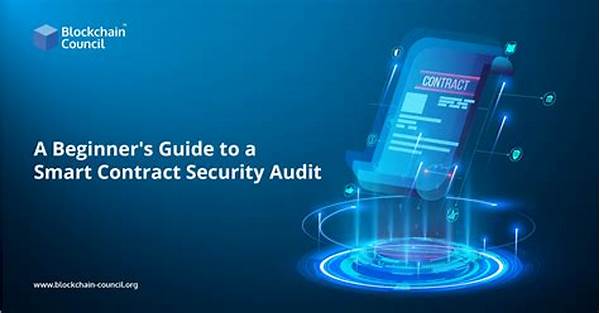Once upon a time, in the wild and decentralized world of blockchain, there was a magical line of code called the “smart contract.” These contracts were like digital wizards, executing commands automatically without human intervention. But, as with all tales of magic, there lurked the shadow of danger — the vulnerability that could be exploited by nefarious code sorcerers. This is where the hero of our story, the “auditor,” steps in to save the day.
Read Now : Lessons Learned From Blockchain Seminar
The Importance of Security in Smart Contracts
Let’s talk straight — the blockchain space can be a bit of a minefield. Imagine smart contracts as these cool, digital vaults that handle crypto and execute deals. But just like any vault, if it’s not secure, it’s basically a candy store for hackers. That’s why auditing smart contracts for security isn’t just, like, some optional extra — it’s essential. Picture someone slipping bugs into your prized code; not cool, right? That’s where the auditors rush in, capes flapping, to ensure everything’s rock solid. They dive deep, checking every nook and cranny to prevent nasty surprises. Honestly, if you’re not auditing smart contracts for security, you might as well leave the keys under the mat for any digital bandit. So, if you’re all about keeping things bulletproof, you know audits are the game plan.
Methods of Auditing Smart Contracts
1. Manual Code Review: The old-school way, manual code review involves experts scrutinizing every line of code. It might seem tedious, but in auditing smart contracts for security, nothing beats a pair of sharp human eyes.
2. Automated Tools: Speeding things up, automated tools run checks across your code. While they can’t replace a human auditor entirely, they’re like having an assistant who never sleeps.
3. Penetration Testing: Think of it as a friendly heist. Ethical hackers try to break into your systems during auditing smart contracts for security, revealing vulnerabilities you didn’t see.
4. Formal Verification: For the math lovers, formal verification uses mathematical proofs to verify contract logic. It’s complex, but it’s a game-changer for ensuring absolute accuracy.
5. Bug Bounties: Inviting the crowd to hack your code may sound nuts, but many eyes mean more chances of spotting issues during the auditing smart contracts for security process. Hackers get paid, and you get a safer contract — win-win!
Why Auditing is Non-Negotiable
Skipping auditing is like trusting a car to drive itself without looking at the map. You’re setting yourself up for a wild ride, but not the fun kind. Auditing smart contracts for security is like plotting out your route beforehand, checking for speed bumps and detours. Smart contracts are untameable beasts if left unchecked, prone to hiccups and being tamed by bad actors. Auditing smart contracts for security transforms these beasts into loyal digital companions. So, if you wanna sleep easy without that panicky ‘Did-I-leave-the-stove-on?’ feeling, make auditing a top-tier priority. Trust me; you won’t regret it when you see others scrambling to manage their chaos.
Tools for Effective Auditing
1. MythX: A savvy tool that combs through Solidity contracts, MythX is a hardcore player in auditing smart contracts for security, uncovering everything from critical bugs to minor glitches.
2. Slither: Lightweight and fast, Slither performs static analysis, making it a perfect companion during the initial audit stages for your smart contracts.
3. Echidna: A fuzzer tool that tests Ethereum contracts, Echidna pokes your code, looking for cracks in the armor, ensuring the auditing smart contracts for security process holds strong.
4. Remix IDE: While primarily a development tool, Remix provides debugging capabilities essential for on-the-fly smart contract adjustments during security audits.
Read Now : Distributed Ledger Technology Benefits
5. Oyente: An analyzer for Ethereum code, Oyente details where your code goes off the rails, making it a staple for auditing smart contracts for security.
6. Securify: Born out of academia, Securify marries thoroughness with user-friendliness, providing a modular approach to smart contract audits.
7. ConsenSys Diligence: Part consultancy, part tool, ConsenSys Diligence brings industry expertise to the table, offering end-to-end auditing smart contracts for security solutions.
8. SmartCheck: Designed to catch vulnerabilities specific to Ethereum, SmartCheck mimics the human intuition that’s crucial in the auditing process.
9. Truffle Security: Integrated into the Truffle suite, this feature allows developers to catch errors early in the dev process, streamlining auditing smart contracts for security.
10. CertiK: With a focus on blockchain mission-critical systems, CertiK provides AI-enhanced tools for comprehensive smart contract security audits.
When to Audit Your Smart Contracts
So, you’re knee-deep in a decentralized app project, and you start wondering, “When’s the perfect time for auditing smart contracts for security?” Here’s the tea: don’t wait till you hit production. That’s like only checking if your parachute’s working mid-jump. Ideally, kickstart auditing during the development phase, like when you start cooking an epic stew and need to check if it’s seasoned right. Regular check-ins ensure everything’s simmering nicely, with no nasty surprises. And don’t skimp on a final audit pre-launch; consider it the dress rehearsal. Because once that code goes live, any security hole could turn into a spaghetti mess. Better safe than sorry — make audits a constant companion in your smart contract life journey.
The Future of Auditing Smart Contracts
Fast-forward the blockchain movie reel and you’ll see that auditing smart contracts for security is evolving at lightspeed. The future’s looking bright, with AI and machine learning injecting serious power into audit processes. Imagine hyper-intelligent systems that understand context, learning and adapting faster than you can say “blockchain breakthrough.” And as Web3 matures, we can expect auditing tools to become even more intuitive, like having a robo-buddy keeping an eye on your contracts 24/7. The result? Rock-solid security that keeps pace with innovation. So, stay ahead of the curve, folks. Keeping your code audit-ready ensures you’re always in the loop, dodging pitfalls and grasping opportunities others might miss. In this ever-changing landscape, one thing’s certain: auditing will continue to be your best ally.
Summary of Auditing Smart Contracts
In the realm of blockchain, security isn’t just an add-on; it’s the whole pizza, and auditing smart contracts for security is the spicy pepperoni that elevates it all. Without audits, smart contracts become black boxes — mysterious and kinda scary. But with rigorous checks, they morph into these majestic digital fortresses, ready to withstand the test of time and malicious attacks. So let’s keep it real: when it comes to blockchain innovation, there’s no room for complacency. Auditing ensures we’re always a step ahead, transforming smart contracts from potential pitfalls into secure foundations. So here’s to keeping our future secure, one audit at a time, while staying chill and enjoying every innovative moment that blockchain serves up. Stay savvy, keep auditing, and let your smart contracts shine in the brightest light.



